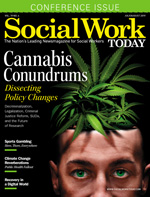|
In 1970, marijuana was classified as a controlled substance and listed as a schedule 1 drug indicating it had no medicinal value and was considered dangerous. Decades of misunderstanding and propaganda about its use preceded that action and prevailed after it. In 1996, California became the first state to legalize medical marijuana, initiating a gradual wave of changes throughout the country. But damage had already been done to communities of color. People of color continue to be targets of discrimination in the enforcement of marijuana law and are the most adversely affected by its criminalization today. Cannabis use is still illegal at the federal level; however, some states have decriminalized, others have legalized medical use, and some states have gone further to legalize “recreational” or adult use. This piecemeal deregulation has created a patchwork quilt of policy changes presenting challenges for behavioral health care providers who assess for substance use disorders and treatment and guide clients on matters of health and well-being. According to Nick Szubiak, MSW, LCSW, founder of NSI Strategies, who is interviewed in this issue’s cover story, “Taking a step back, for a public health approach to substance use, what concerns me is the spirit of the message generated by other interested parties in the legalization of marijuana. We’re seeing the impact of the business model where there is money to be made by states through taxation, and business models that have profited through the making and distribution of marijuana. … The concerning message is that it’s safe.” It is known that marijuana is unsafe for the developing brains of adolescents and for pregnant women. What more is yet to be discovered about the substance? Research is being conducted; however, the product used is the type of cannabis used 30 years ago, nothing like the product for sale in states that have legalized. Research must continue and in order to facilitate that, cannabis must be rescheduled. The so-called War on Drugs resulted in the mass incarceration of people of color and the poor for using and/or selling marijuana. Some argue that the criminal justice system must right those wrongs before licensing the wealthy to do the same. Cannabis policy changes present not only medical, behavioral health, and research issues but important social justice challenges as well. Marianne Mallon |

 Editor’s Note: Marijuana Mixed Bag
Editor’s Note: Marijuana Mixed Bag